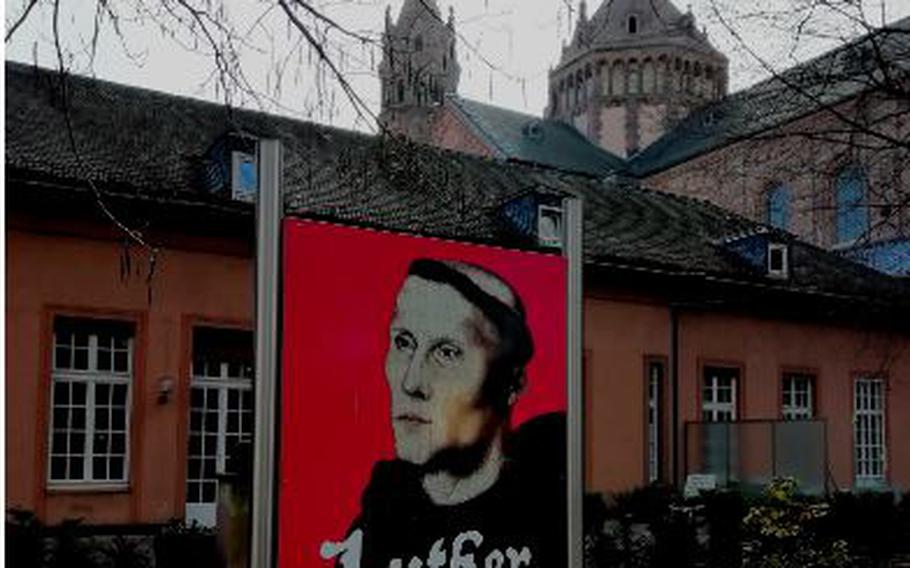
Worms, Germany, is set to celebrate Martin Luther this spring. (Karen Bradbury)
Alongside the Rhine, in the well-worn city of Worms, history is always palpable. This is especially so this year, as the city marks the 500th anniversary of one of the key events in the life and times of Dr. Martin Luther, the Protestant reformer whose ideas went on to split the Christian church and reshape European society.
Martin Luther was born on November 10, 1483, in Eisleben, Saxony, to parents of peasant lineage. In 1501, he entered the University of Erfurt, on track to fulfilling his father’s wish for him to become a lawyer. Caught in a terrifying thunderstorm in 1505, Luther is said to have invoked St. Anne, the patron saint of miners, for protection, vowing to become a monk if he were to survive the ordeal. He joined an Augustinian order, but monastic life proved difficult and enlightenment elusive. In 1510, Luther made a trip to Rome by foot, but the opulence, corruption and priestly incompetence he witnessed in the capital of Christendom left him more disillusioned than ever. In 1517, he revealed his 95 theses questioning practices of the Catholic Church. Although it’s disputed as to whether he actually nailed these to the door of the castle church in Wittenberg, the theses, along with the continuing publication of writings seen as heretical, led to his excommunication by the pope. In 1521, he was called to appear before Emperor Charles V at the Diet of Worms. On April 18, when asked to repudiate his writings, Luther concluded his prepared speech with the following words: ... I cannot and will not retract, for we must never act contrary to our conscience. ... Here I stand. God help me! Amen!
A series of events slated to take place in April and beyond recall this key moment in European history. While ever-evolving COVID-19 containment measures will influence the final form in which activities will take place (or result in their cancellation altogether), the “Widerrufsverweigerung Worms 1521” (Refusal to recant Worms 1521) includes a reenactment of Luther’s arrival by wagon in Worms at 4 p.m. April 16. The “Luther Moment,” in which the market square by the Holy Trinity Church will serve as a giant screen for the projection of images and video mapping, is scheduled to begin April 17 at 11 p.m.
The Lutherweg is a 220-mile hiking trail linking up a number of places connected to Martin Luther. As it wends its way from the Wartburg Castle to Worms, it passes through rural landscapes and historical sites in the states of Hesse, Rhineland-Palatinate and Thuringia. From April 16-18, modern-day pilgrims are invited to retrace the final legs of Luther’s journey to Worms, each day covering a distance ranging from seven to 13 miles. The route passes through vineyards and handsome wine villages, and most start and end points are connected by train. KulturSinn Rhein-Selz offers packages for walkers consisting of maps, informational materials and vouchers for take-away products. Online: kultursinn-rhein-selz.de
“Here I stand -- Conscience and Protest - 1521 to 2021” is the title of an exhibition to be held at the Worms City Museum. With Martin Luther’s refusal to recant as its starting point, the exhibition traces the development of freedom of conscience and protest and explores the idea of civil courage. Pioneers for equal rights including Martin Luther King, Nelson Mandela and others are also spotlighted. The exhibition runs July 3-Dec. 30; adult entry costs 9 euros. Online: museum-andreasstift.de
For a couple weeks in July each year, Worms hosts an open-air theatrical production, usually based on the Nibelungen saga. This year’s spectacle, Luther, is a world premiere that tells the tale of intrigues between powerful players in the affairs of state and how one man manages to shake the church to its core. Performances are offered in German only. The festival runs July 16-Aug. 1 and ticket prices start at 29 euros. Online: nibelungenfestspiele.de
Commemorative events aside, Worms makes a wonderful place to immerse oneself in all things Luther. Luther’s appearance in Worms created a strong bond between the city and the Reformation movement, evidenced in its monuments and traditions. The Lutherdenkmal (Luther Monument), unveiled in 1868, recalls the early history of the Reformation with statues of politicians and humanists connected with Luther, the coats of arms of the towns and cities that joined the movement, three allegorical figures symbolizing the movement’s impact, and Luther himself, holding a Bible aloft.
The Bishop’s Palace that played host to the Diet of Worms was destroyed in 1689. The Heylshof Garden, a shady space in the shadow of the city’s cathedral, now occupies the site of Luther's interrogation. Here, an interactive, educational walkway features a plaque with quotes from Luther’s famed speech, a bronze relief of the former palace being split in half by a bolt of lightning, and a bronze sculpture titled “Luther's Big Shoes,” inviting visitors to literally step into Luther’s footprints.
Rick Steves’ “Luther and the Reformation,” available on YouTube, makes a compelling introduction to the reformer’s remarkable biography.